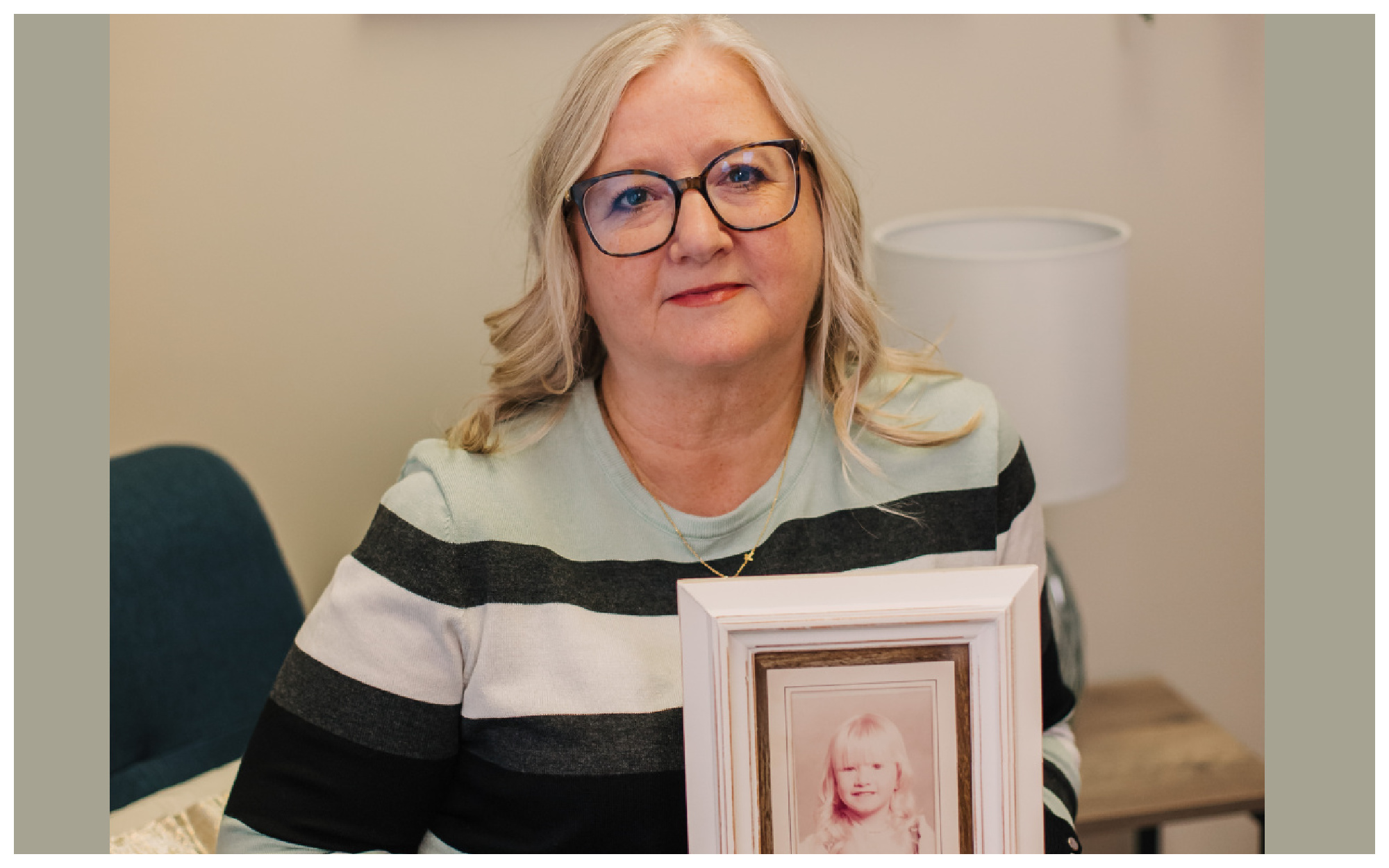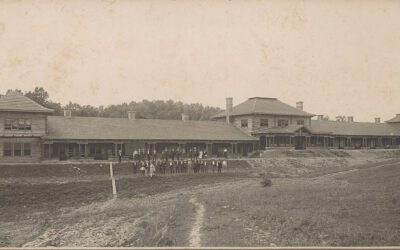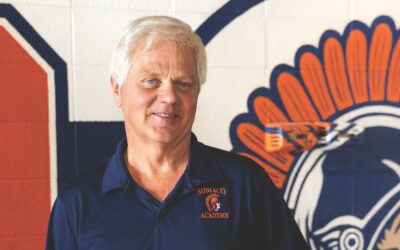The following story contains the topic of sexual child abuse and mentions self-harm. While heartbreaking to discuss, these issues are not uncommon. The non-profit Hamilton Center in Fort Smith, Arkansas, works with children in the aftermath of trauma. Child Abuse Hotline for Arkansas: 800.482.5964 (TDD: 800.843.6349)
Laurie Burnett sits inside her office at the Hamilton Center for Child Advocacy in Fort Smith. On the wall is a sign that reads “Be Fearless.” Petite, shiny blond hair that grazes her shoulders, a delicate gold butterfly on a chain around her neck, she looks better suited to hugs and consolation than feats of bravery. When she speaks, her voice is so soft it’s hard to pick up on an audio recorder. But don’t be fooled.
Because on a shelf behind her is a framed kindergarten photo of a tiny blond in a crisp cotton dress, circa 1970s. Asked why Laurie does this job, she points at the picture. “For that little girl,” she says.
That little girl is Laurie, and it was about that age when she realized something was terribly wrong with her family. The man she’d always believed was her biological father—he was not—was molesting her and had been for some time. She believed what she suffered through must happen in every family.
Today, the Center for Disease Control estimates that approximately one in four girls and one in twenty boys will experience sexual abuse during childhood. Ninety-one percent of the perpetrators will be members of that child’s family.
She was eleven before the Norman, Oklahoma police came calling. By that time, her stepfather had abused another family member, and friends of Laurie’s. “He was a longtime pedophile,” Laurie says. “He knew what threats to use to keep you quiet.
“My mom and I were displaced; that was his home… We were homeless. My mom was a basket case… She believed me instantly, but she was out there on her own wondering how she was going to support this girl and get her the help she needs.”
Laurie, visibly shaken, was interviewed by two male, uniformed, armed officers while her mother and uncle watched. No one helped Laurie and her mother find housing, so they couch-surfed for a while. Because there was no organized support, Laurie was left to figure things out on her own and stumbled plenty along the way. She married at sixteen years of age. The marriage started on rough seas. It eventually broke apart.
In 2009, Laurie, now happily remarried, was involved in a Bible study, and looking for her calling. She’d planned to go to Cambodia to work with victims of sex trafficking. Through a series of events, she met Jackie Hamilton, who was starting the then-Hamilton House. Laurie became a forensic interviewer—the person who talks to the child on their first visit—and found she had a natural gift for talking to kids who’d been through abuse.
Today, Laurie is the executive director of the Hamilton Center for Child Advocacy, which is accredited by the National Children’s Alliance and covers Sebastian, Crawford, and parts of Logan and Franklin Counties. Her staff of twelve, all female, are the best of the best, she says. In 2023, they saw nine hundred eighty new clients. Six hundred four were female, three hundred seventy-six male. Sixty-eight percent of them were there because of sexual abuse. Physical abuse accounted for another twenty-three percent, and severe neglect approximately seven percent.
“When somebody makes a call to the [Arkansas Child Abuse] Hotline, the case is assigned to an investigator either at the Department of Human Services (DHS) or the Crimes Against Children State Police Investigator (CACD), depending on the allegation, and that investigator calls us… We’ll set an appointment, and we’ll determine from the allegation what kind of services are needed.”
When the child, along with their non-offending parent or caregiver (never the person the allegation has been launched against), comes to the center, they’re met by a Hamilton Center advocate who makes them as comfortable as she can and tells them what’s going to happen during their visit. Approximately seventy-five percent of the time, the allegation involves sexual abuse.
The mother who brings her child might be having a hard time accepting that the abuse has happened. “She might be totally dependent on this person,” Laurie says. “She might not have anywhere to go. She might be afraid he’s going to hurt her… We’ll try to get her the help that she needs… Success to us is when they come in scared and worried and leave feeling like they have someone they can lean on.”
Those mothers may need a restraining order through the Prosecutor’s Office, or housing through HUD, or help from the Crisis Intervention Center (fscic.org or 800.359.0056). The Hamilton Center advocates serve as a connection to those places.
A forensic nurse is on staff if a physical exam is needed. There is an on-site pantry if the child and family lacks food.
“We’re going to make a relationship with them,” Laurie says. “They’re going to have an advocate who helps them. We’re going to let them know that we’re here no matter what.”
Sometimes the allegations turn out to be unfounded. But for the children (from newborn to age eighteen) who are being abused, there is a pathway to healing. After the Hamilton Center forensic interviewer talks to the child, away from the family, she reports her findings to either the police or DHS. Therapy is offered, and the child is sent home with a “comfort bag” filled with things like fuzzy socks, fidget toys, snacks. “We want that child to know that there are adults who care about them.”
Michelle (not her real name), who’s now an adult, remembers the soft socks from her comfort bag. Today, she is wearing a gray hoodie and faded jeans, her eyelashes so lush they seem unreal.
As she begins to talk, there’s a quality in her speech, steely and certain. She describes the moment when she finally had the courage to tell her mother that her stepfather was sexually abusing her. Michelle’s fear was palpable. Would her mother hate her? Would her stepdad hurt her mom? What if her mother took her stepdad’s side?
When Michelle, a self-described mama’s girl, speaks again, the heavens fall. “She chose him,” she says, dipping her chin. Even after all this time, the memory feels like a sword turned against herself. But Michelle persisted, telling her biological father of the abuse. She moved in with him, and she says he did everything he could to help. Sometimes at night, though, she’d hear him sobbing. That crushed her already broken heart.
Michelle’s saving grace was coming to the Hamilton Center. Social worker Natalia Alarcon, who’s sitting nearby, became Michelle’s advocate. Natalia wears eyeliner that sweeps past the corners of her dark eyes. She has a dimple on her cheek that looks planted there for effect. She talks with her hands, rings on her fingers and thumbs.
“She doesn’t look like the same girl today,” Natalia says. When she first started coming, Michelle wore baggy clothes that hid her body. Defeat showed in her bowed head, her hunched shoulders, her frame folded as if to take up as little space as possible. Before she was interviewed on her first visit, she was crying so hard the session had to be delayed.
Near the beginning of their relationship, Michelle called Natalia, the burden of what had happened nearly freezing her in place. It was too much, she told Natalia, and she was thinking about hurting herself. Natalia’s team jumped into action, and Michelle was given the immediate help she needed. The girl, whose life had been upended, finally saw a tiny star of hope.
Weekly therapy—there is no charge for any of the services— with staff therapist Marsha Kinsey was a godsend. “It wasn’t like talking to a therapist,” Michelle says. “It was like talking to a friend, someone you’ve known your whole life.”
Her improvement wasn’t linear—it’s normal to have setbacks—but gradually, Michelle found ways to reclaim her life. There are times during the interview when she has everyone in the room laughing. Her wit is sharp as a tack, and her delivery flawless. It’s as if she’s found her way back to the young woman she was always meant to be.
She has a message for kids in crisis. “I was you a couple of years ago, I thought my whole world was going to end.” She smiles. “Look at me now.”
Michelle carries the confidence of someone much older. It’s hard to imagine her any other way, but there was a battle to get here, one she might not have won without the help of the Hamilton Center. Asked what advice she’d give her younger self, she says, “I’d probably tell her, ‘You know what? It’s okay to cry. You cry, and you let it all out because you’re going to be crying for the rest of your life. You’re human; everyone cries. It’s going to be hard. But just wait… You’re going to make it…’ This is not their life,” Michelle adds, “just another bump in the road.”
A bump in the road looking back, but at the time it seemed like a boulder the size of a mountain. Then she met Natalia and Laurie. Those heroes in heels took her by the hand and showed her the pathway to a better road, and Michelle trusted them enough to take the first step.
Laurie is watching Michelle closely. There are similarities in their stories. And there are profound differences. Michelle was given the help she needed. The little girl in the crisp cotton dress deserved so much better than what she got. Laurie couldn’t protect herself, but she could help others like her. And that has made all the difference.
Child Abuse Hotline for Arkansas: 800.482.5964 (TDD: 800.843.6349)
Hamilton Center for Advocacy: hamiltoncca.org
On April 2, there will be a Raise Your Voice rally at UAFS. On April 13, Hunt the Fort takes place. This family-friendly scavenger hunt helps raise money to ensure that the services at the Hamilton Center for Child Advocacy (free of charge to all families) continue. To register, visit hamiltoncca.org.




